| Srl | Item |
| 1 |
ID:
140956
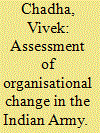

|
|
|
|
|
| Summary/Abstract |
The article analyses military change in the context of the Indian Army, with specific focus on organisational innovation and change. In doing so, it analyses two case studies: restructuring of the army after the Sino-Indian War of 1962; and mechanisation based on the 1975 expert committee recommendations. On the basis of these case studies, the article assesses the drivers and desirables for organisational change in the Indian Army, with the further aim of deriving policy recommendations which are especially apt in light of the ongoing transformation of the army. It identifies operational environment and technology as the principle drivers for change, with doctrine and strategic culture having a limited impact. It further concludes that successful change requires long-term strategic assessment, supportive political leadership, visionary and committed military leadership, strong institutional structures and follow-up action.
|
|
|
|
|
|
|
|
|
|
|
|
|
|
|
|
| 2 |
ID:
132249
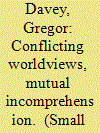

|
|
|
|
|
| Publication |
2014.
|
| Summary/Abstract |
Writing on British intelligence has tended to concentrate on the collection machinery in specific local contexts, the development of the Joint Intelligence Committee and the use of intelligence product by government. The emphasis has been on the optimisation of the intelligence bureaucracy in the face of Colonial Office intransigence. What this analysis largely leaves out, however, is a description of the culture and practices of the Colonial Office as it attempted to work with various colonial governments. Instead there is a tendency to overemphasise the rational nature of the bureaucratic changes in Whitehall and the contribution of MI5 and MI6 in the maintenance of security in the colonies. This article seeks to address these oversights by examining the divisions between the Colonial Office and the rest of the Whitehall intelligence machinery and show how counter-subversion remained a challenge to administrators both before and after the emergence of the Joint Intelligence Committee system.
|
|
|
|
|
|
|
|
|
|
|
|
|
|
|
|
| 3 |
ID:
146990
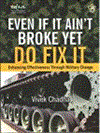

|
|
|
|
|
| Publication |
New Delhi, Pentagon Press (IDSA), 2016.
|
| Description |
x, 192p.: tables, chartshbk
|
| Standard Number |
9788182749191
|
|
|
|
|
|
|
|
|
|
|
|
Copies: C:2/I:0,R:0,Q:0
Circulation
| Accession# | Call# | Current Location | Status | Policy | Location |
| 058766 | 355.033054/CHA 058766 | Main | On Shelf | General | |
| 058767 | 355.033054/CHA 058767 | Main | On Shelf | General | |
|
|
|
|
| 4 |
ID:
073228
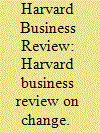

|
|
|
|
|
| Publication |
Boston, Harvard Business School Press, 1998.
|
| Description |
v, 228p.Pbk
|
| Series |
The Harvard business review paperback series
|
| Standard Number |
0875848842
|
|
|
|
|
|
|
|
|
|
|
|
Copies: C:1/I:0,R:0,Q:0
Circulation
| Accession# | Call# | Current Location | Status | Policy | Location |
| 051522 | 658.406/HAR 051522 | Main | On Shelf | General | |
|
|
|
|
| 5 |
ID:
075231
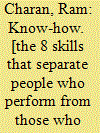

|
|
|
|
|
| Publication |
New York, Crown Business, 2007.
|
| Description |
209p.Hbk
|
| Standard Number |
9780307341518
|
|
|
|
|
|
|
|
|
|
|
|
Copies: C:1/I:0,R:0,Q:0
Circulation
| Accession# | Call# | Current Location | Status | Policy | Location |
| 052001 | 658.4092/CHA 052001 | Main | On Shelf | General | |
|
|
|
|
| 6 |
ID:
075338
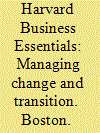

|
|
|
|
|
| Publication |
Boston, Harvard Business School Press, 2003.
|
| Description |
vi, 138p.
|
| Standard Number |
0070656568
|
|
|
|
|
|
|
|
|
|
|
|
Copies: C:2/I:0,R:0,Q:0
Circulation
| Accession# | Call# | Current Location | Status | Policy | Location |
| 052011 | 658.16/HAR 052011 | Main | On Shelf | General | |
| 054112 | 658.16/HAR 054112 | Main | On Shelf | General | |
|
|
|
|
| 7 |
ID:
040654
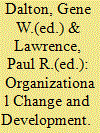

|
|
|
|
|
| Publication |
Illinois, Richard D. Irwin, Inc., 1970.
|
| Description |
x, 393p.
|
|
|
|
|
|
|
|
|
|
|
|
Copies: C:1/I:0,R:0,Q:0
Circulation
| Accession# | Call# | Current Location | Status | Policy | Location |
| 007455 | 658.1/DAL 007455 | Main | On Shelf | General | |
|
|
|
|
| 8 |
ID:
149438
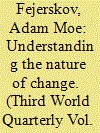

|
|
|
|
|
| Summary/Abstract |
This article argues that core lines of sociological institutionalist thought provide a set of valuable conceptual and theoretical vocabularies for exploring and explaining contemporary concerns of development cooperation. It identifies four broad categories of issues of central attention in the current study of development cooperation, and couples these with four avenues of sociological institutional research that may provide us with theoretical and conceptual frameworks for further empirically exploring and theoretically extrapolating these. Increasing attention to these theoretical concerns not only helps us progress the study of development cooperation, it may also allow us to inform contemporary institutional thinking.
|
|
|
|
|
|
|
|
|
|
|
|
|
|
|
|